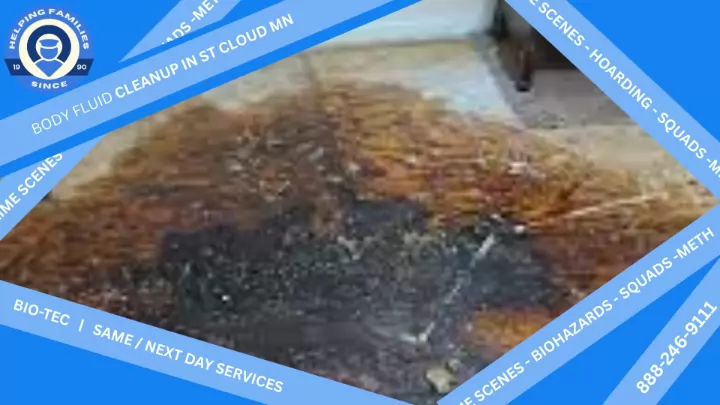¤®Ė The Scientific Necessity: Why Post Crime Blood And Body Fluid Removal Services Demand Bio-TecŌĆÖs Expert Compliance Did you know that handling just one milliliter of contaminated blood without proper protection can transmit deadly pathogens? This startling fact underscores why the cleanup after any traumatic incident is not a cleaning problem it is a public health emergency. When violence, accident, or death occurs, the resulting blood and body fluid removal services must be executed by certified professionals. Ignoring this critical step means risking catastrophic health consequences and facing severe legal liabilities. Standard cleaning methods simply cannot neutrali

Post Crime Blood And Body Fluid Removal
¤®Ė The Scientific Necessity: Why Post Crime Blood And Body Fluid Removal Services Demand Bio-T...
Expert Bodily Fluid Cleanup Services: How Bio-Tec Ensures Health, Safety, and Compassion Did you know that a single drop of blood can carry pathogens that can live on surfaces for days, or even weeks? The cleanup of human or animal bodily fluids be it blood, vomit, urine, or feces is far more than a simple matter of sanitation. It is a critical biohazard situation. These substances can harbor a dangerous array of bacteria, viruses, and other pathogens that pose a significant health risk to anyone who comes into contact with them.For families, businesses, or property managers in McWilliams, AL, the decision to hire a professional for "Bodily Fluid Cleanup ser

Bodily Fluid Cleanup Services
Expert Bodily Fluid Cleanup Services: How Bio-Tec Ensures Health, Safety, an...
What characterizes the Dry/Skeletal stage?
The body is reduced to bones and tough connective tissue. Environmental factors greatly influence the timing of this stage, and insect activity is minimal.
What cleaning protocols are followed for contamination of vehicle cup holders?
Cup holders are cleaned with specialized tools and disinfected to ensure complete safety.
How do cleanup crews handle hazardous liquid spills?
Hazardous liquids are contained, absorbed using specialized materials, neutralized, and then safely disposed of following strict protocols.
How do professional cleanup services protect against future contamination?
Professional cleanup services go beyond immediate decontamination to implement measures that reduce the risk of future contamination. This includes thorough inspections, the use of advanced cleaning agents, and the proper disposal of biohazard materials. Professionals may also provide recommendations for ongoing property maintenance and preventive measures. These efforts ensure the long-term safety and health of the property and its occupants.
Can air quality testing improve sleep quality?
Yes, air quality testing can have a direct impact on sleep quality. Poor air quality, caused by pollutants like dust mites, mold, or high levels of carbon dioxide, can disrupt sleep by causing respiratory discomfort or allergic reactions. Testing identifies these issues, enabling solutions such as air purifiers, better ventilation, or allergen-proof bedding. Clean air promotes deeper and more restful sleep, which is essential for physical and mental well-being. In spaces like bedrooms, maintaining optimal air quality is especially important for individuals with sleep apnea or other breathing-related conditions. Professional testing ensures that your sleep environment supports good health and rejuvenation.
How long does a hoarding cleanup take?
The duration of a hoarding cleanup depends on several factors, including the severity of the hoarding, the size of the home, and the amount of clutter. A minor cleanup may take a few hours to a day, while extreme cases can take several days or even weeks. Professional cleanup teams work efficiently to sort, remove, and clean up items while ensuring the process is not overwhelming for the client. Some companies offer phased cleanups to help individuals adjust gradually to the decluttering process.
What health risks are associated with meth contamination?
Exposure to meth contamination can lead to various health issues, including respiratory problems, headaches, dizziness, nausea, skin and eye irritation, and, in severe cases, damage to the liver and kidneys.
How do pigeon droppings damage buildings?
The acidic nature of pigeon droppings can corrode metal, stone, and concrete surfaces, leading to structural deterioration over time.
How do remediation teams ensure all meth contamination is removed?
Professional remediation teams follow a multi-step protocol to ensure complete decontamination. This typically starts with an initial assessment and laboratory testing to map contamination levels. The next step involves removing and properly disposing of contaminated materials, such as drywall, carpets, and insulation. Non-porous surfaces are treated with industrial-grade cleaners designed to break down and neutralize meth residues. After cleaning, a post-remediation test is conducted to confirm that contamination levels fall below legal or recommended thresholds. In some cases, encapsulation techniques (like sealing surfaces with paint) are used as an extra safety measure. Every step is documented and often reviewed by health departments for compliance.
Can meth residue be transferred between surfaces?
Yes, meth residue can be transferred from one surface to another. This usually happens when contaminated dust or particles are disturbed and settle elsewhereŚeither through air circulation, cleaning attempts, or human contact. For example, if someone touches a contaminated wall and then a doorknob, residues can be spread. This is why remediation often involves comprehensive cleaning of all surfaces, not just the ones initially found to be contaminated. Cross-contamination is particularly problematic in shared spaces like apartment complexes and can lead to a broader scope of required remediation if not properly addressed.
HOME > blog > Bodily Fluid Cleanup > mcwilliams > al
